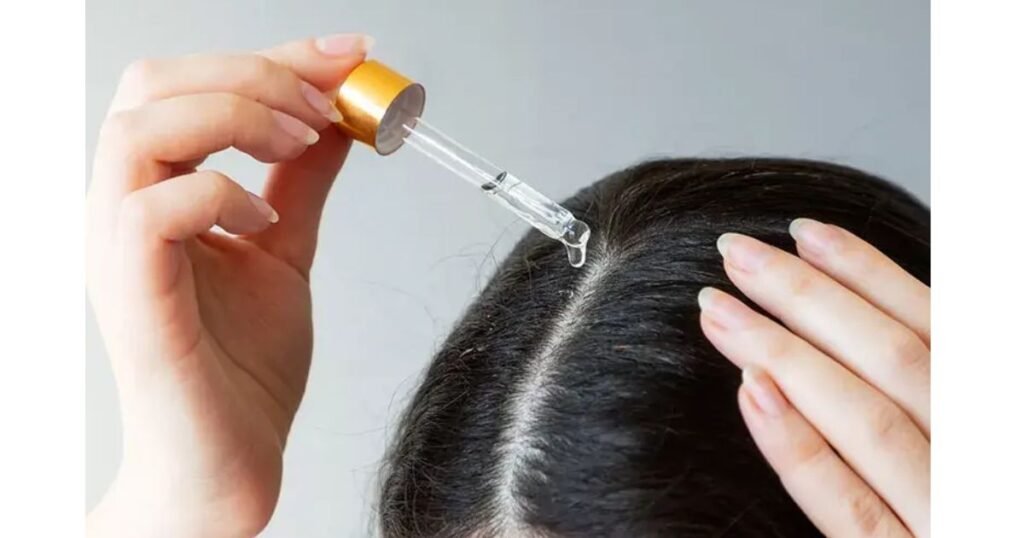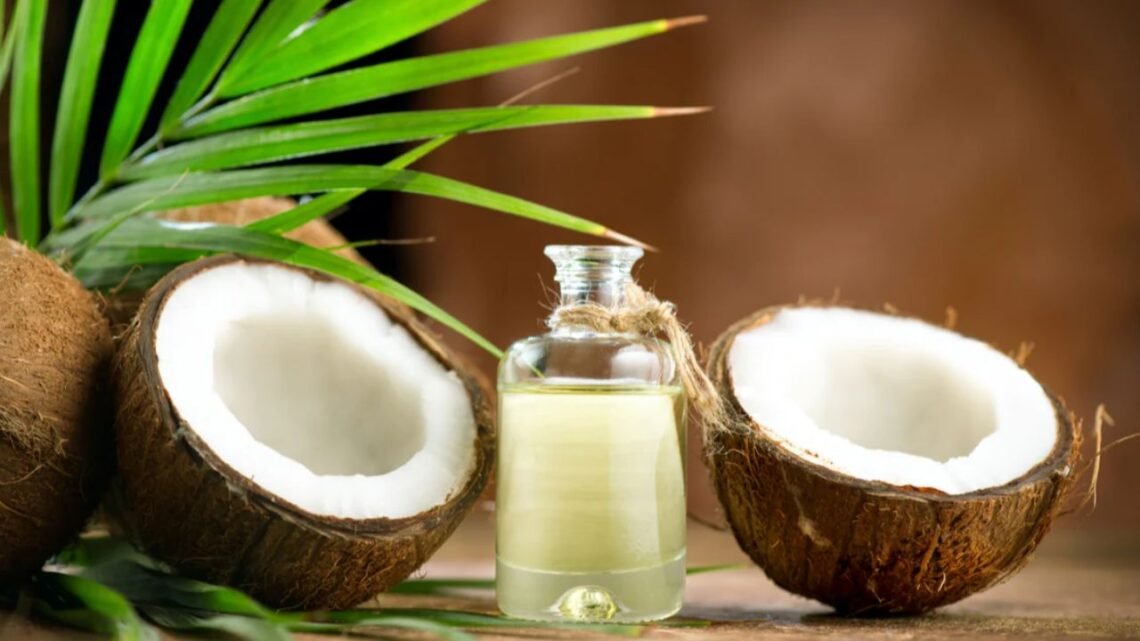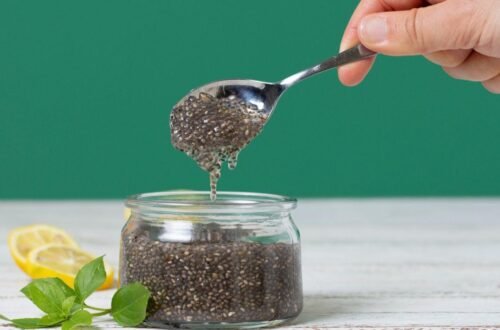Coconut oil for hair has been a trusted beauty remedy for generations. It is known for its natural ability to restore shine, repair damage, and keep hair soft and strong. Rich in vitamins, fatty acids, and antioxidants, this simple oil provides deep nourishment for both the scalp and hair.
Many people still wonder, is coconut oil good for your hair? The answer is yes. When used correctly, it moisturizes, strengthens, and protects your hair from everyday damage. This guide explores how coconut oil works, how to use it, and why it remains one of the most powerful natural treatments for hair.
About Coconut Oil for Hair
Coconut oil for hair is made from the white flesh of coconuts. It contains a high amount of lauric acid, a fatty acid that easily penetrates the hair shaft and bonds with hair proteins. This allows it to repair and protect your strands from within.
It also contains vitamin E, iron, and other nutrients that support scalp health and hair growth. Unlike many synthetic products, coconut oil does not contain chemicals that strip away moisture. Instead, it creates a protective barrier that locks hydration in and keeps your hair soft and smooth.
This natural oil is versatile and can be used in many ways—before washing, as a conditioner, or as a leave-in treatment. It is suitable for most hair types and provides lasting results with regular use.
| Nutrient | Benefit for Hair |
| Lauric Acid | Strengthens hair proteins |
| Vitamin E | Adds shine and softness |
| Iron | Improves scalp circulation |
| Capric Acid | Reduces dandruff |
| Antioxidants | Protect against damage |
Why Is Coconut Oil So Popular for Hair?
Coconut oil for hair is popular because it delivers visible results without the use of chemicals. It repairs dry strands, tames frizz, and makes hair appear smooth and glossy. The oil also helps in reducing split ends and maintaining scalp moisture.
For centuries, people have used it as a deep conditioner and scalp treatment. Its natural compounds help balance the scalp’s oil production while reducing inflammation and itchiness. It can also protect hair from UV damage and pollution.
So, when people ask, is coconut oil good for your hair? the answer is clear — yes, it works for almost every hair type.
| Hair Concern | Effect of Coconut Oil |
| Dry Hair | Restores moisture |
| Frizz | Smooths and softens strands |
| Split Ends | Strengthens and seals ends |
| Dandruff | Reduces flakes and itching |
| Dullness | Adds shine and gloss |
What Does Coconut Oil Do for Your Hair?
Coconut oil strengthens your hair by reducing protein loss. It forms a protective layer around each strand, preventing damage from heat styling, coloring, or environmental stress. The lauric acid in coconut oil is particularly effective because it deeply penetrates the hair cuticle.
It also works as a natural moisturizer. By locking in hydration, it prevents dryness and makes hair look fuller and healthier. If your hair is brittle or damaged, applying coconut oil regularly can restore its softness and shine.
In addition, coconut oil has natural antifungal properties that help control dandruff and scalp infections. It balances the scalp’s pH, so your hair stays clean and nourished without becoming greasy.
How to Use Coconut Oil for Hair?
Knowing how to use coconut oil for hair properly is key to getting the best results. You can use it as a pre-wash oil, a deep conditioner, or even as an overnight mask. Warming the oil slightly before applying helps it absorb faster and more evenly.
Here are a few simple ways to include it in your hair care routine:
1. As a Pre-Wash Treatment
Apply warm coconut oil to your scalp and hair 30 minutes before shampooing. Focus on the ends and mid-lengths. This prevents the shampoo from stripping away natural oils and keeps your hair soft after washing.
2. As a Conditioner
You can use coconut oil instead of your regular conditioner or add a few drops to your conditioner. This enhances hydration, making your hair silky and easy to detangle.
3. As an Overnight Hair Mask
Massage one tablespoon of oil into your scalp and hair. Cover your head with a towel and leave it overnight. Wash it off the next morning with a mild shampoo. This method gives deep nourishment and leaves your hair visibly stronger.
| Method | Purpose | Recommended Duration |
| Pre-wash Oil | Prevents dryness and breakage | 20–30 minutes |
| Conditioner | Enhances shine and smoothness | Leave-in |
| Overnight Mask | Deep repair and hydration | 6–8 hours |
Restoring Moisture and Shine
One of the main reasons to use coconut oil for hair is to restore lost moisture. Hair loses water due to exposure to sunlight, wind, and frequent washing. Coconut oil’s structure allows it to enter deep into the hair shaft and seal in moisture.
This helps prevent frizz, dullness, and breakage. Regular use gives your hair a glossy appearance and makes it soft to the touch. You can apply a small amount after washing to enhance shine and reduce flyaways.
If your hair is extremely dry or damaged, using coconut oil three times a week can help restore its natural texture.
Coconut Oil for Scalp Health and Dandruff Control

Coconut oil is also excellent for scalp health. It reduces dryness, itching, and dandruff by moisturizing and soothing the scalp. The antifungal and antibacterial properties of the oil fight the yeast responsible for dandruff.
Massaging a few drops into your scalp improves blood circulation and promotes healthy hair growth. The oil also forms a thin layer that protects the scalp from dirt and pollution.
If you struggle with dandruff, try applying coconut oil twice a week and rinse after one hour. It helps balance natural oils and leaves your scalp refreshed.
| Scalp Issue | Effect of Coconut Oil |
| Dandruff | Fights fungus and reduces flakes |
| Dryness | Moisturizes scalp and hair roots |
| Itchiness | Soothes irritation |
| Inflammation | Reduces redness and sensitivity |
Choosing the Right Coconut Oil
When selecting coconut oil for hair, always go for the purest option. Virgin and cold-pressed coconut oils are the best choices. They retain the natural nutrients that benefit your hair. Refined oils, on the other hand, may contain additives that can reduce their effectiveness.
Look for labels that mention “organic,” “cold-pressed,” or “unrefined.” These indicate minimal processing and no chemical treatment. Store your oil in a cool, dry place to maintain its quality.
| Type of Oil | Description | Best For |
| Virgin Coconut Oil | Natural, aromatic, and nutrient-rich | All hair types |
| Cold-Pressed Oil | Extracted without heat | Sensitive scalp |
| Refined Oil | Processed and odorless | Occasional use |
Is Coconut Oil Good for Your Hair Type?
Every hair type benefits differently from coconut oil. Straight, wavy, curly, and coarse hair all have unique needs. Knowing how your hair reacts helps you decide how much oil to apply.
If you have thin or oily hair, use only a small amount to avoid buildup. For thick or dry hair, a slightly larger amount will be more effective. Adjust your frequency based on how your hair feels after application.
| Hair Type | Coconut Oil Effect |
| Straight Hair | Adds shine and smooth texture |
| Wavy Hair | Defines waves and reduces frizz |
| Curly Hair | Locks moisture and enhances curls |
| Coarse Hair | Softens and reduces stiffness |
| Thin Hair | Adds strength without heaviness |
Homemade Coconut Oil Hair Masks
Coconut oil can be combined with other natural ingredients to create effective hair masks. These masks deeply nourish the hair and improve texture.
1. Coconut Oil and Honey Mask
Mix one tablespoon of coconut oil with one teaspoon of honey. Apply evenly to your hair and leave it on for 30 minutes. Rinse well. This mask adds shine and hydration.
2. Coconut Oil and Aloe Vera Mask
Blend two teaspoons of coconut oil with one spoon of aloe vera gel. Apply from roots to ends. Leave for 45 minutes and wash. This combination soothes irritation and adds moisture.
3. Coconut Oil and Yogurt Mask
Mix equal parts yogurt and coconut oil. Massage it into your scalp and leave for 40 minutes. This mask strengthens weak strands and adds volume naturally.
How Often Should You Use Coconut Oil?
The frequency of using coconut oil for hair depends on your hair’s condition. For dry or damaged hair, apply two to three times per week. For normal hair, once a week is enough. If your hair tends to get oily quickly, focus only on the ends. Avoid daily applications to prevent buildup. Consistent use will improve your hair’s texture and shine over time.
Precautions and Side Effects
Although coconut oil for hair is safe, some people may be allergic to it. Always perform a patch test before using it on your scalp. Avoid overusing the oil, as it can clog pores or make fine hair limp.
If you have scalp infections or skin conditions, consult a dermatologist before applying coconut oil. Always use high-quality, unrefined oil for the best results.
Conclusion
So, is coconut oil good for your hair? Absolutely. This natural oil remains one of the most effective ways to keep your hair healthy and strong. It nourishes deeply, prevents dryness, and restores shine. When you know how to use coconut oil for hair properly, the difference becomes clear. It softens rough strands, soothes the scalp, and adds a beautiful natural gloss. Coconut oil for hair is affordable, safe, and easy to use. With consistent care, it can transform dull, lifeless hair into soft, radiant locks. It’s a timeless remedy that truly stands the test of time.
Read Our More Blogs: Top 10 Chia Seeds Benefits for Skin





